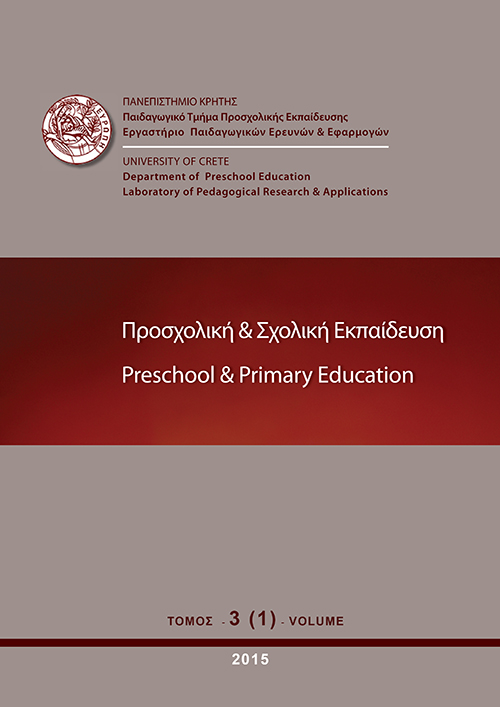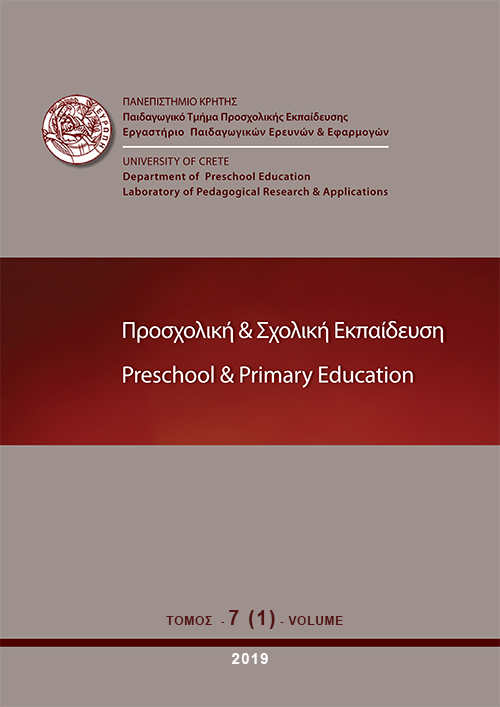The effect of body-weight and obesity bias on children’s self-esteem
Abstract
Article Details
- Come citare
-
Kornilaki, E. N. (2014). The effect of body-weight and obesity bias on children’s self-esteem. Preschool and Primary Education, 3(1), 3–16. https://doi.org/10.12681/ppej.137
- Fascicolo
- V. 3 N. 1 (2015)
- Sezione
- Άρθρα
Οι συγγραφείς των άρθρων που δημοσιεύονται στο ΠΡΟΣΧΟΛΙΚΗ & ΣΧΟΛΙΚΗ ΕΚΠΑΙΔΕΥΣΗ διατηρούν τα δικαιώματα πνευματικής ιδιοκτησίας επί των άρθρων τους, δίνοντας στο περιοδικό το δικαίωμα της πρώτης δημοσίευσης. Άρθρα που δημοσιεύονται στο ΠΡΟΣΧΟΛΙΚΗ & ΣΧΟΛΙΚΗ ΕΚΠΑΙΔΕΥΣΗ διατίθενται με άδεια Creative Commons 3.0 και σύμφωνα με την άδεια μπορούν να χρησιμοποιούνται ελεύθερα, με αναφορά στο/στη συγγραφέα και στην πρώτη δημοσίευση για μη κερδοσκοπικούς σκοπούς και με δικαίωμα τροποποίησης μόνον με παρόμοια διανομή (αν αναμείξετε, τροποποιήσετε, ή δημιουργήσετε πάνω στο υλικό, πρέπει να διανείμετε τις δικές σας συνεισφορές υπό την ίδια άδεια όπως και το πρωτότυπο). To Εργαστήριο Παιδαγωγικών Ερευνών και Εφαρμογών του Παιδαγωγικού Τμήματος Προσχολικής Εκπαίδευσης του Πανεπιστημίου Κρήτης και το Εθνικό Κέντρο Τεκμηρίωσης διατηρούν το δικαίωμα να δημοσιεύουν, να αναπαραγάγουν, να παρουσιάζουν στο κοινό, να διανέμουν και χρησιμοποιούν άρθρα που δημοσιεύονται στο ΠΡΟΣΧΟΛΙΚΗ & ΣΧΟΛΙΚΗ ΕΚΠΑΙΔΕΥΣΗ σε οποιοδήποτε μέσο και μορφή είτε μεμονωμένα είτε ως μέρη συλλογικών έργων, για όλο το χρόνο διάρκειας προστασίας της πνευματικής ιδιοκτησίας και για όλες τις χώρες του κόσμου. Αυτό περιλαμβάνει ενδεικτικά και όχι αποκλειστικά, το δικαίωμα δημοσίευσης των άρθρων σε τεύχη του περιοδικού ΠΡΟΣΧΟΛΙΚΗ & ΣΧΟΛΙΚΗ ΕΚΠΑΙΔΕΥΣΗ, αναπαραγωγής και διανομής μεμονωμένων αντιγράφων των άρθρων, αναπαραγωγής ολόκληρων των άρθρων σε άλλη έκδοση του Εργαστηρίου Παιδαγωγικών Ερευνών και Εφαρμογών του Παιδαγωγικού Τμήματος Προσχολικής Εκπαίδευσης του Πανεπιστημίου Κρήτης και του Εθνικού Κέντρου Τεκμηρίωσης και αναπαραγωγής και διανομής των άρθρων ή περίληψης αυτών με χρήση πληροφορικού συστήματος αποθετηρίου.
Downloads
Riferimenti bibliografici
Braet, C., Tanghe, A., Decaluwe, V., Moens, E., & Rosseel, Y. (2004). Inpatient treatment of children with obesity: Weight loss, psychological well-being, and eating behavior. Journal of Pediatric Psychology, 29, 519-529.
Burrows, A., & Cooper, M. (2002). Possible risk factors in the development of eating disorders in overweight pre-adolescent girls. International Journal of Obesity, 26, 1268-1273.
Cole, T. J., Bellizi, M. C., Flegal, K. M., & Dietz, W. H. (2000). Establishing a standard definition for child overweight and obesity worldwide: International survey. British Medical Journal, 320, 1240-1243.
Coopersmith, S. (1967). The antecedents of self-esteem. San Francisco: W. H. Freeman & Co.
Cramer, P., & Steinwert, T. (1998). Thin is good, fat is bad. How early does it begin? Journal of Applied Developmental Psychology, 19(3), 429-451.
Crandall, C. S., & Biernat, M. (1990). The ideology of anti-fat attitudes. Journal of Applied Social Psychology, 20, 227-243.
Crystal, D. S., Watanabe, H., & Chen, R S. (2000). Reactions to morphological deviance: A comparison of Japanese and American children and adolescents. Social Development, 9, 40-61.
Davison, K. K. & Birch, L. L., (2001). Weight status, parent reaction, and self-concept in five-year-old girls. Pediatrics, 107(1), 46 -53.
Davison, K. K.,& Birch, L. L. (2002). Processes linking weight status and self-concept among girls from ages 5 to 7 years. Developmental Psychology, 38, 735-748.
Davison, K. K., & Birch, L. L. (2004). Predictors of fat stereotypes among 9-year-old girls and their parents. Obesity Research, 12(1), 86-94.
Franklin, J., Denyer, G., Steinbeck, K. S., Caterson, J. D., & Hill, A. J. (2006). Obesity and risk of low self-esteem: A statewide survey of Australian children. Pediatrics, 118, 2481-2487.
French, S. A., Story, M., & Perry, C. L. (1995). Self-esteem and obesity in children and adolescents: A literature review. Obesity Research, 3, 479-490.
Friedman, K. E., Reichmann, S. K., Costanzo, P. R., Zelli, A., Ashmore, J. A., & Musante, G. J. (2005). Weight stigmatization and ideological beliefs: Relation to psychological functioning in obese adults. Obesity Research, 13(5), 907-915.
Gibson, L. Y., Byrne, S. M., Blair, E., Davis, E. A., Jacoby, P., & Zubrick, S. R. (2008). Clustering of psychosocial symptoms in overweight children. Australian and New Zealand Journal of Psychiatry, 42(2), 118-125.
Gray, W. N., Kahhan, N. A., & Janicke, D. M. (2009). Peer victimization and pediatric obesity: A review of the literature. Psychology in Schools, 46(8), 720-727.
Greenberg, B. S., Eastin, M., Hofshire, L., Lachlan, K., & Brownell, K. D. (2003). The portrayal of overweight and obese persons in commercial television. American Journal of Public Health, 93, 1342-1348.
Greenleaf, C., & Weiller, K. (2005). Perceptions of youth obesity among physical educators. Social Psychology of Education, 8, 407-423.
Griffiths, L. J., Parsons, T. J., & Hill, A. J. (2010). Self-esteem and quality of life in obese children and adolescents: A systematic review. International Journal of Pediatric Obesity, 5, 282-304.
Hague, A. L., & White, A. A. (2005). Web-based intervention for changing attitudes of obesity among current and future teachers. Journal of Nutrition Education and Behavior, 37(2), 58-66.
Harter, S. (1985). Manual for the self-perception profile for children. Denver, CO: University of Denver Press.
Hesketh, K., Wake, M., & Waters, E. (2004). Body mass index and parent-reported self-esteem in elementary school children: evidence for a causal relationship. International Journal of Obesity, 28, 1233-1237.
Holub, S. C. (2008). Individual differences in the anti-fat attitudes of preschool children: The importance of perceived body size. Body Image, 5, 317-321.
Jelalian, E., & Mehlenbeck, R. (2002). Peer-enhanced weight management treatment for overweight adolescents: Some preliminary findings. Journal of Clinical Psychology in Medical Settings, 9(1) 15-23.
Klesges, R. C., Haddock, C. K., Stein, R. J., Klesges, L. M., Eck., L. H., & Hanson, C. L. (1992). Relationship between psychosocial functioning and body fat in preschool children: A longitudinal investigation. Journal of Consulting and Clinical Psychology, 60(5), 793-796.
Kornilaki, E. (in press). Peer-acceptance of obese preschool children. In Proceedings of the XVI European Conference on Developmental Psychology – ECDP. Bologna: Medimond International Proceedings.
Koroni, M., Garagouni-Areou, F., Roussi-Vergou, C. J., Zafiropoulou, M., & Piperakis, S. M. (2009). The stigmatization of obesity in children. A survey in Greek elementary schools. Appetite, 52, 241-244.
Latner, J. D., & Stunkard, A. J. (2003). Getting worse: The stigmatization of obese children. Obesity Research, 11(3), 452-456.
Latner, J. D., Stunkard, A. J., & Wilson, T G. (2005). Stigmatized students: Age, sex, and ethnicity effects in the stigmatization of obesity. Obesity Research, 13, 1226-1231.
Makri-Mbotsari, E. (2001). How I perceive myself - II. Athens: Ellinika Grammata [in Greek].
Mellin, A. E., Neumark-Sztainer, D., Story, M., Ireland, M., & Resnick, M. D. (2002). Unhealthy eating behaviors and psychosocial difficulties among overweight adolescents: The potential impact of familial factors. Journal of Adolescent Health, 31, 145-153.
Mendelson, B. K., White, D. R., & Mendelson, M. J. (1996). Self-esteem and body esteem: Effects of gender, age, and weight. Journal of Applied Developmental Psychology, 17, 321-346.
Mirza, N., M., Davis, D., & Yanovski, J. A. (2005). Body dissatisfaction, self-esteem, and overweight among inner-city Hispanic children and adolescents. Journal of Adolescent Health, 36, 267.e16-e20.
Musher-Eizenman, D. R., Holub, S. C., Miller, A. B., Goldstein, S. E., & Edwards-Leeper, L. (2004). Body-size stigmatization in preschool children: The role of control attributions. Journal of Pediatric Psychology, 29(8), 613-620.
Nowicka, P. (2007). Low-intensity family therapy intervention is useful in a clinical setting to treat obese and extremely obese children. International Journal of Pediatric Obesity, 2(4), 211-217.
Neumark-Sztainer, D., Falkner, N., Story, M., Perry, C., Hannan, P. J., & Mulert, S. (2002). Weight-teasing among adolescents: Correlations with weight status and disordered eating behaviors. International Journal of Obesity, 26, 123-131.
O’Brien, R. W., Smith, S. A., Bush, P. J., & Peleg, E. (1990). Obesity, self-esteem, and health locus of control in black youths during transition to adolescence. American Journal of Health Promotion, 5(2), 133-139.
Penny, H., & Haddock, G. (2007). Children’s stereotypes of overweight children. British Journal of Developmental Psychology, 25, 409-418.
Phillips, R. G., & Hill, A. J. (1998). Fat, plain, but not friendless: Self-esteem and peer acceptance of obese pre-adolescent girls. International Journal of Obesity, 22, 287-293.
Pierce, J. W., & Wardle, J. (1997). Cause and effect beliefs and self-esteem of overweight children. Journal of Child Psychology and Psychiatry, 38, 645-650.
Piers, E. V. & Harris, D. B. (1964). Age and other correlates of self-concept in children. Journal of Educational Psychology, 55, 91-95.
Puhl, R. M., & Brownell, K. D. (2003). Psychosocial origins of obesity stigma: Towards changing a powerful and pervasive bias. Obesity Reviews, 4, 213-227.
Puhl, R.M. & Brownell, K. D. (2006). Confronting and coping with weight stigma: an investigation of overweight and obese adults. Obesity, 14(10), 1802-1815.
Puhl, R. M., & Latner, J. D. (2007). Stigma, obesity, and the health of the nation’s children. Psychological Bulletin, 133(4), 557-580.
Rosenberg, M. (1979). Conceiving the self. New York: Basic Books.
Shin, N. Y., & Shin, M. S. (2008). Body dissatisfaction, self-esteem, and depression in obese Korean children. Journal of Pediatrics, 152(4), 502-506
Southall, J. E., Okely, A. D., & Steele, J. R. (2004). Actual and perceived physical competence in overweight and nonoverweight children. Pediatric Exercise Science, 16, 15-24.
Strauss, R. (2000). Childhood obesity and self-esteem. Pediatrics, 105(1):e15.
Strauss, R. S., & Pollack, H. A. (2003). Social marginalization of overweight children. Archives of Pediatric and Adolescent Medicine, 157, 746-752.
Wardle, J., & Cooke, L. (2005). The impact of obesity of psychological well-being. Best Practice & Research Clinical Endocrinology & Metabolism, 19(3), 421-440.
Zeller, M. H., Reiter-Purtill, J., & Ramey, C. (2008). Negative peer perceptions of obese children in the classroom environment. Obesity, 16(4), 755-762.




